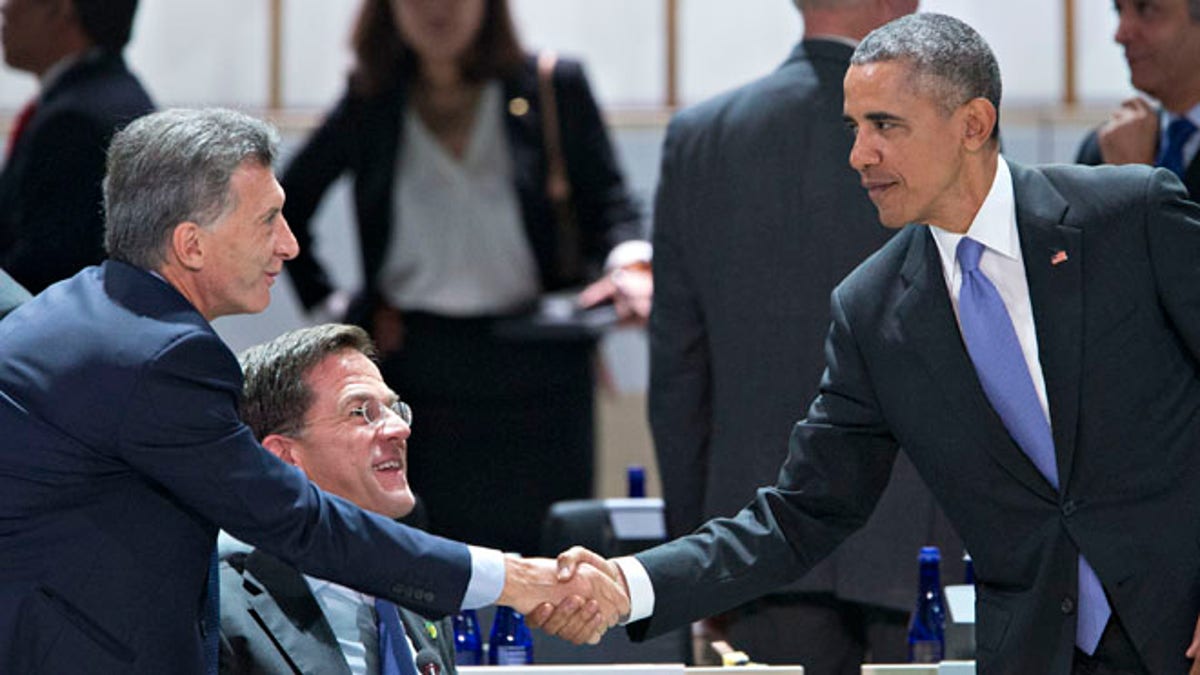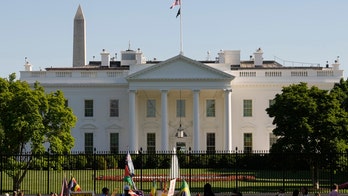
U.S. President Barack Obama, right, shakes hands with Mauricio Macri, Argentina's president at the Nuclear Security Summit on April 1, 2016 in Washington, D.C. (2016 Getty Images)
The inauguration of late Venezuelan President Hugo Chávez in 1999 marked the beginning of what has been referred to as Latin America’s “pink tide” – a wave of elections that ushered in leftist leaders in country's like Argentina, Bolivia, Brazil, Uruguay and Ecuador.
But 17 years later, the tide appears to have ebbed: Chávez is dead, and the movement he helped start is fast receding throughout Latin America as the politicians who followed his lead are either out of office or on the ropes.
Chávez’s successor in Venezuela, Nicolás Maduro, is dealing with a legislature controlled by a failing economy; Ecuadoran President Rafael Correa has said he won’t run for another term; Argentina recently elected the center-right Maurico Macri as president after more than a decade of populist rule under the governments of Néstor Kirchner and his widow, Cristina Fernández de Kirchner; and Brazil is in the process of impeaching its president, Dilma Rousseff.
The sea change, experts say, appears to be ushering in more moderate leaders who are retaining the populist social program that got their predecessors elected, while also looking for a more friendly relationship – politically and in business – with the global community.
As Latin America is facing a new era, the United States itself is on the verge of a historic election, and the next occupant of the White House will be greeted by a different – and friendlier – Latin America than greeted Barack Obama in 2008.
“The fundamental nature of the relationship has changed,” Jason Marczak, director of the Latin America Economic Growth Initiative at the Atlantic Council's Adrienne Arsht Latin America Center, told Fox News Latino. “The U.S. is now looking at Latin America for partnerships and how we can work together.”
The most notable change in terms of U.S. relations – apart from the re-establishment of ties with Cuba – will be in Argentina, where the recently-elected Macri is hoping to repair the two countries' rocky relationship that Fernández de Kirchner appeared to revel in during her two terms in office.
Macri has worked to bring the country out of its diplomatic isolation by reaching out to Europe and the U.S. – evidenced by Obama’s recent trip to the country – and Washington repaid by filing an amicus brief to help resolve Argentina’s problem with holdout creditors so they can re-enter international capital markets.
The American Chamber of Commerce in Argentina has said that U.S. firms are committed to investing $2.3 billion in Argentina over the next 18 months. The two countries also inked an agreement on joint steps to fight climate change, as well as agreeing to work together to combat drug trafficking and the spread of the Zika virus.
Argentina – along with other stable democracies in the region like Chile and Uruguay – are expected to play a crucial role in dealing with any fallout from Venezuela as the political and economic crisis there continues to deepen.
“The Argentine government together with the center-left governments of Uruguay and Chile would be in the best position to work behind the scenes with the U.S. if there is any instability in Venezuela,” Cynthia Arnson, director of the Latin America program at the Woodrow Wilson International Center, told FNL.
The other superpower in the region that might be interested in fostering better relations with the U.S. is Brazil.
Currently in the midst of a major political crisis with the impeachment of Rousseff, Brazil is also facing a bad recession – with the country’s economy expected to shrink by 3.5 percent this year – the rapid spread of the Zika virus and the stress from the infrastructure and logistical nightmare that a major international event like the Rio de Janeiro Olympic Games in August can present.
Despite the upheaval, experts seem to agree that better relationships with the U.S. could be fostered by acting President Michel Temer or by whomever becomes president next.
Despite being a career politician, Temer is known as something of anomaly ideologically. He mixes Rousseff’s economic interventionist predilection with a social liberalism that includes opposition to the death penalty and favoring legal abortions.
Unlike Rousseff, Temer is also popular among financiers for his detailed plan to help Brazil's crumbling economy, which the Financial Times called "the ultimate investors' wish list." He has promised to cut spending and privatize many sectors currently controlled by the state.
Alessandra Ribeiro, an economist at Tendencias, a São Paulo-based consultancy, said Temer and his government likely will adopt a "different mind-set toward the economy — a more mainstream, market-friendly approach." She expects the Brazilian economy to turn around and resume growing in 2017.
Besides the continent's two largest nations, analysts say that the U.S. will maintain good relations with its arguably closest ally in the region, Colombi, as that nation approaches a deal that could end more than 50 years of civil conflict.
“Colombia on the verge of a peace deal, and the U.S. has long been a major supporter of Colombia,” Marczak said. “If that happens, then it's just as critical that the U.S. work on democracy-building as it has in combating the [guerrilla group] FARC.”




